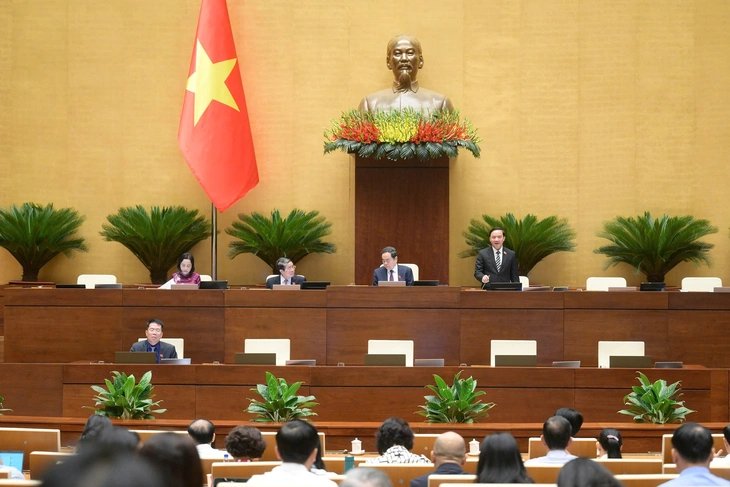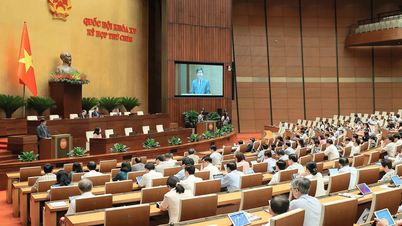Scene of the morning meeting on June 25 - Photo: GIA HAN
On the morning of June 25, with 429/439 delegates present in favor, 2 delegates against, and 8 delegates not voting, the National Assembly passed the Law amending and supplementing a number of articles of the Penal Code.
Death sentences imposed before July 1, 2025 that have not been executed will be converted to life imprisonment.
Notably, the newly passed bill has abolished the death penalty for eight crimes and the maximum sentence for these crimes is life imprisonment.
These crimes include: Activities aimed at overthrowing the people's government (Article 109); Sabotaging the material and technical facilities of the Socialist Republic of Vietnam (Article 114); Producing and trading in counterfeit medicines and disease prevention products (Article 194); Illegally transporting narcotics (Article 250); Sabotaging peace and waging aggressive wars (Article 421); Espionage (Article 110); Embezzlement of property (Article 353); Taking bribes (Article 354).
Regarding the transitional provisions, the law stipulates that the death penalty imposed before July 1, 2025 for those who committed the above 8 crimes of the Penal Code but have not yet served the sentence will not be executed and the Chief Justice of the Supreme People's Court will decide to convert the death penalty to life imprisonment.
The National Assembly assigned the Supreme People's Court to preside over and coordinate with the Ministry of Public Security , the Ministry of National Defense, the Supreme People's Procuracy and relevant agencies to organize the review of death row inmates who are eligible to have their death sentence converted to life imprisonment in accordance with regulations.
Why does the Government propose to abolish the death penalty for 8 crimes?
Previously, Minister of Justice Nguyen Hai Ninh presented a report on receiving and explaining opinions on the draft Law amending and supplementing a number of articles of the Penal Code.
According to Mr. Ninh, the Government proposed reducing the number of crimes punishable by death in order to continue institutionalizing the Party's viewpoints and policies in the document announcing the Politburo's opinion on continuing to reduce the death penalty.
Along with that, on the basis of inheriting the spirit of gradually narrowing the death penalty in the Penal Code through amendments and supplements, specifically:
In the 1985 Penal Code, there were 44 crimes punishable by death. In the 1999 Penal Code, there were 29 crimes punishable by death. In the 2009 revised Penal Code, there were 22 crimes punishable by death. In the 2015 Penal Code, there were only 18 crimes punishable by death.
In this amendment, the Government proposed to remove 8 crimes with the death penalty based on careful research and assessment of the issues.
Accordingly, based on the nature and extent of the crime; the importance of the protected object; the ability to remedy the consequences caused by the crime.
Based on the results of the summary of the implementation of the Penal Code, many crimes have provisions for the death penalty but have not been applied in practice in recent times.
Referring to international experience, it shows that currently, the trend of reducing the death penalty in legal regulations as well as in actual implementation in the world is common.
Of the 193 countries that are members of the United Nations, only more than 50 countries still have regulations on the death penalty.
Vietnam's responsibilities and obligations as a member of relevant international treaties, especially Article 6, Clause 2 of the United Nations Covenant on Civil and Political Rights, stipulate: "In countries where the death penalty has not been abolished, the death penalty may only be applied for the most serious crimes.
Along with that, serving our country's international cooperation activities, especially in the current context, when Vietnam is expanding international cooperation extensively in all areas of social life, building a legal system similar to the majority of countries in the world.
This will contribute significantly to promoting increasingly strong cooperative relations and mutual trust. At the same time, it also demonstrates the responsibility and capacity of state management agencies and law enforcement agencies in the current period.
From the above issues, the Government finds that the abolition of the death penalty for 8 crimes as in the bill submitted to the National Assembly is appropriate in the current conditions of our country.
On the one hand, it still meets the requirements of fighting and preventing crime, while at the same time meeting the process of continuing to reduce the death penalty, as well as the requirements of cooperation and expanding international relations to develop the country.
Particularly for the crimes of embezzlement and bribery, after abolishing the death penalty, in order to ensure the recovery of assets obtained from crimes and at the same time encourage criminals to actively report during the process of resolving cases, the draft law has amended and supplemented regulations in the following direction:
"A person sentenced to life imprisonment for embezzlement or bribery can only have his/her sentence reduced if he/she has actively returned at least three-quarters of the embezzled or bribed property and has actively cooperated with authorities in detecting, investigating, and handling crimes or has made great achievements."
Tuoitre.vn
Source: https://tuoitre.vn/quoc-hoi-dong-y-bo-an-tu-hinh-voi-8-toi-danh-trong-do-co-tham-o-tai-san-nhan-hoi-lo-20250625084856611.htm




![[Photo] Prime Minister Pham Minh Chinh receives CEO of Samsung Electronics](https://vphoto.vietnam.vn/thumb/1200x675/vietnam/resource/IMAGE/2025/8/26/373f5db99f704e6eb1321c787485c3c2)



![[Photo] Brilliant red of the exhibition 95 years of the Party Flag lighting the way before the opening](https://vphoto.vietnam.vn/thumb/1200x675/vietnam/resource/IMAGE/2025/8/27/e19d957d17f649648ca14ce6cc4d8dd4)
![[Photo] Prime Minister Pham Minh Chinh chairs meeting of National Steering Committee on International Integration](https://vphoto.vietnam.vn/thumb/1200x675/vietnam/resource/IMAGE/2025/8/26/9d34a506f9fb42ac90a48179fc89abb3)



























































![[Photo] General Secretary To Lam attends Meeting with generations of National Assembly deputies](https://vphoto.vietnam.vn/thumb/402x226/vietnam/resource/IMAGE/2025/8/27/a79fc06e4aa744c9a4b7fa7dfef8a266)

































Comment (0)